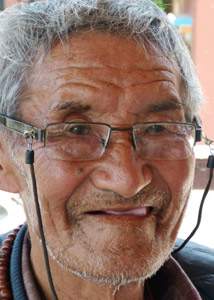Name: Norbu
(Alias: No)
Gender: Male
Interview Age: 85
Date of Birth: 1930
Birthplace: Tsang, Utsang, Tibet
Year Left Tibet: 1959
Profession: Nomad
Monk/Nun: No
Political Prisoner: No

Interview No.: 50N
Date: 2015-04-16
Language: Tibetan
Location: Tashi Palkhiel, Pokhara, Gandaki, Nepal
Categories: Culture and History
Keywords: childhood memories, Chinese -- oppression under, customs/traditions, escape experiences, marriage practices, refugee in Nepal -- life as, Utsang
Summary:
Norbu was born in Tsang into a middle class family and was the eldest of five siblings. His family did farming and later when he left home as a makpa 'groom' to Namru, he became a nomad and a salt gatherer. He explains the difference between these two activities, believing farming to be more difficult work. Norbu describes the tradition of nama 'bride' and makpa and how marriages were traditionally arranged by the parents.
Norbu says that the oppression by the Chinese, their objection to practicing the dharma and confiscation of wealth led to the decision to flee from his hometown. He describes the problems the large group of escapees faced on the long journey which took 8-9 months to reach Mustang in Nepal. They survived, initially by eating some of their animals and selling some, and later when there were no animals left, they sold their jewelry to the tribal people.
Norbu and the other refugees started a new life in the Tashi Palkhiel Settlement in Pokhara, built the houses and received foreign aid. Norbu worked as a porter for foreigners going on mountain treks and now he spends his time selling souvenirs and chanting prayers.
Interview Team:
- Marcella Adamski (Interviewer)
- Henry Tenenbaum (Videographer)
- Palden Tsering (Interpreter)

